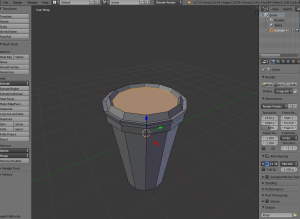I usually go to the UW-Madison Writer’s Institute each spring–it’s a great way to connect to writer friends and meet new people, and spend a weekend in Madison. And, for a dose of extra awesomeness, I had two winning entries in the First Page of Poem Contest (1st and 2nd places in the YA category.) This contest is about writing a compelling beginning (first page, so about three hundred words-ish) that will hook your reader. For the writer, it’s an exercise in anguish as you try to polish and hone such a short piece…
The first pages I submitted are from my YA trilogy about the rise of vastly-beyond-human artificial intelligence. The first book is close to being ready to query (and the Writer’s Institute is just the thing to motivate me to just get the damn thing done and out the door.)
Ist Place PROJECT JOEY
The first time the feds came for me at school, I’d been pretty freaked out—probably the effect they were going for when they read me my rights in the principal’s office. I was only ten, so sobbing was probably a reasonable reaction under the circumstances. Still, later, I was a little disappointed in myself.
The second time, I saw the black car with government plates pull up, and so I had time to put on a convincingly innocent and confused face while remaining calm. Same agents, same black suits and ties. Same questions for me. Same angry mother having to leave work to deal with her delinquent son.
This time, though, I could tell things were going to go down differently.
For one thing, I wasn’t expecting them—I hadn’t been technically breaking the law in my online activities in some time. So, when the speaker broke into my English class and requested my presence in the office, I had this idea that it was about my science fair award. I knew I was going to win–when your project has to do with self-assembling nanobot swarms, it stands out from the usual middle school displays on how bean plants grow better when you talk to them.
I was mentally rehearsing how humble and surprised I’d be, but as I turned the corner I practically ran into my two personal federal agents. They gave me the usual death glare.
Two other guys were with them. One guy had a t-shirt with digits of pi arranged in fractal swirls, and the other one’s shirt had a Tardis from Dr.Who. Both had a little scruffy beard growth, and they were very clearly not federal agents.
I knew them—not them, personally, but the kinds of guys they were. Engineers or programmers or someone who actually knew what they were doing in the digital realm.
The feds had brought along guys like me. And that meant that this time, they might actually figure out what I’d been up to.
FEEDBACK FROM JUDGES ON THIS STORY
This is compelling because we have the Feds coming after a teenager, and he admits he’s been up to something they are interested in. This feels big in scope. It’s also well-written; the flow is excellent. In addition, this is clean of typos or mistakes in punctuation, etc. This is a pro writer deserving of attention from any agent or editor or reader.
2nd Place Relinquishment
From my hotel room window I can see the cheerful stick-figure WALK Guy, and the serious, no-messing-around DO NOT WALK hand. I’ve been bored, so I’ve timed them by counting in my head: forbidding red hand for thirty seconds, happy WALK guy for twenty.
The real people walking do not look cheerful or happy like WALK guy, though. It has been raining and snowing, and with the subways and trains all shut down, most people just walk in the slush.
But they have to be careful, because the people who are driving aren’t always watching for pedestrians. I’ve seen five people hit while I’ve been in the hotel. People have forgotten, my mom says. It’s been a while since people thought of cars as something that could kill you, and I guess even if you know that it’s just people driving them now, it’s easy to forget and step in front of them when WALK Guy says to.
I wonder if autonomous vehicles are banned in other countries, too, and for about the ten-thousandth time, I reach for my phone before I remember it’s gone. Phones were the first thing that the Relinquishment Regulations targeted.
Not that my phone would do any good, because the internet came apart (or was dismantled, depending on who you talk to) right about the same time. And then the electrical grid went down, and although we’ve got power now it’s iffy. The WALK guy sometimes goes dark and motionless and the cars and pedestrians become a mass of slowly twirling eddies on the pavement. From above it reminds me of swirls of milk in hot chocolate.
Thinking about hot chocolate that reminds me of our kitchen at home, and that place is gone now. Just a smear of radioactive rocks, probably, although my mom says it wasn’t a nuke, just a regular missile. Even they wouldn’t have used a nuclear weapon against U.S. citizens, she says, but anyone we talked to said that they’d heard it was a nuke.
FEEDBACK FROM JUDGES ON THIS STORY
This is clever! It feels fresh with the character making something of “WALK Guy” and “DO NOT WALK hand”. We’re told right away that this very observant character has also seen five people hit by traffic while he’s been at the hotel. And then we find out that phones have been banned by the Relinquishment Regulations! Any young person reading this is now pretty darn hooked. We also learn that their home is gone. We’re turning the page.
43.073052
-89.401230







You must be logged in to post a comment.